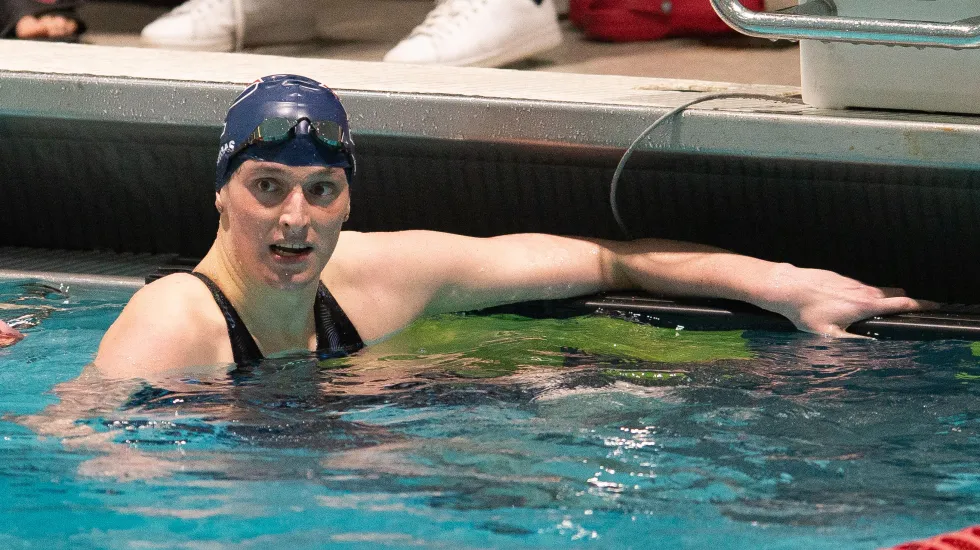
Last weekend, Lia Thomas, a transgender female swimmer at the University of Pennsylvania, won the 500-yard freestyle at the NCAA women’s swimming championships in Atlanta.
Thomas, formerly Will Thomas, was born male and swam on the Penn men’s team until transitioning to female after the 2019 season. Because the 2020-21 season was canceled because of COVID, this was the first season she competed as a woman.
To say her racing at the highest collegiate level — and winning — has created a firestorm of controversy is to understate badly. Everybody from transgender activists to Title IX defenders to right-wing screamers to transgender woman Caitlyn Jenner (formerly men’s Olympic decathlon champion Bruce Jenner) have weighed in.
Thomas’ success is either equality spreading its societal wings or the end of the female sporting world as we know it. It might be a little of each and neither completely. It’s a very complex topic that needs more study to find out what is inclusive and fair. And, remember, those two words aren’t identical.
As it stands, Thomas did nothing wrong by competing as a woman. Though she was a Texas high school All-American as a boy, stands just under 6-4 and has the broader shoulders and narrower hips of a man, she took the required testosterone suppressants for more than a year and broke no rules.
As the Penn athletic department wrote on Twitter: ‘‘Lia Thomas has met or exceeded all NCAA protocols over the past two years for a transgender male student-athlete to compete for a women’s team.’’
So why the uproar?
Defenders say it’s only because Thomas won that anyone cares at all. There are lots of transgender female athletes who aren’t dominant, and to use the rare exception to make new rules repressing all transgender athletes would be grossly unfair.
There are others — perhaps almost all casual observers — who simply can’t wrap their brains around the concept of a person changing genders.
And then there are those more involved in sports — the parents, coaches and female athletes themselves who compete against the transgender athletes. Very few of them are happy about this.
One swimmer knocked out of the finals by Thomas wrote in a letter to the NCAA: ‘‘I can’t help but be angry or sad. It hurts me, my team and other women in the pool.’’
Other female swimmers at Penn allegedly were warned that if they came out against Thomas competing as a woman, they would be labeled as transphobic and find it harder to find employment after graduation. Still, 16 teammates anonymously threw in with former Olympic swimming gold medalist Nancy Hogshead-Makar, now a civil-rights attorney, in a letter she sent Penn and the Ivy League that asked them ‘‘to support us as biological women.’’
Yes, it’s a deep irony that battlers such as Hogshead-Makar and former tennis star and out lesbian Martina Navratilova, both longtime advocates for women’s sports, see the trans inclusion as a step backward for women and competition.
Perhaps the biggest problem is identifying what it means to be female. It sounds simple, but it’s not.
The modern Olympics have struggled with the issue forever. First there was the infamous ‘‘nude parade’’ in front of a panel of judges. Then there were chromosome markers. Then came mandating that testosterone levels be less than 10 nanomoles per liter.
Each of these has problems, not the least of which is that the mere act of going through puberty as a boy changes all. It gives one the lifelong advantage of longer limbs, greater height, greater heart and lung capacity, even more red blood cells. In swimming, bigger feet and hands are a real plus.
There’s also the issue that one out of every 1,500 to 2,000 humans is born with atypical genitalia. And others are born with anatomies that don’t match their chromosomes.
Now it’s all kind of the Wild West, with many sports organizations left to make their own determinations about who is a woman. Jenner said in 2016: ‘‘There’s no trans person, male to female, that’s out there dominating. It just doesn’t happen.’’
She was wrong. And now Jenner has changed her mind, saying Thomas’ NCAA victory was ‘‘not fair.’’
In the 500, Thomas beat three competitors who had medaled in the Tokyo Olympics. She had scrawled ‘‘Let Trans Kids Play’’ on her right arm.
It’s hard not to feel for her and her quest in a hostile world, but sometimes inclusion isn’t fair.
And fairness is what matters most.







